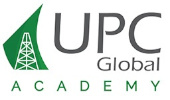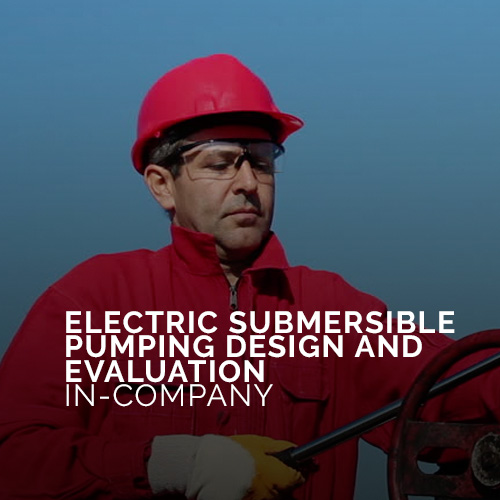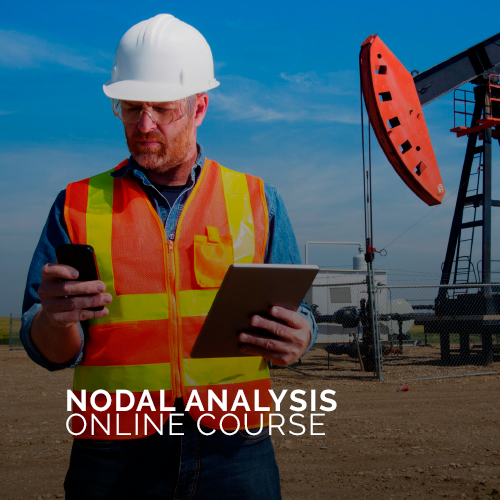GENERAL PURPOSE OF THIS COURSE
Understand the nodal analysis principles, the concepts, the phenomena involved and how they are interrelated with the ultimate goal to predict flows and pressures throughout the system for production or injection Wells.
SPECIFIC OBJECTIVES
- Understand the Nodal Analysis advantages and limitations.
- Understand in detailed the IPR curve for both single and multiphase flow.
- Understand in detail single and multiphase flow in pipes. Multiphase correlations flow, how they developed and how they are used.
- Understand how PVT data affect multiphase flow correlation. Multiphase flow correlations selection and tuning.
- Select the node location and interpret inflow and outflow curves
- Apply Nodal analysis Interpretation for well optimization or selection of the best scenario.
COURSE CONTENT
Nodal Analys definition and fundamentals
Inflow
- Undersaturated reservoirs (single phase)
- Saturated reservoir (multiphase)
Outflow
- Single phse
- Multiphase
Interpretation of Nodal Analysis of production wells.
Nodal analysis special topics
- Injection wells
- Integration with surface gathering network and reservoir simulators
SKILLS AND KNOWLEDGE
The attendee will:
- Understand how to use the Nodal Analysis for well study and optimization
- Understand the assumptions and limitations of nodal analysis
- Understand the multiphase flow phenomena in pipes and the effect in wells
- Understand the information required and how and Nodal analysis is done regardless of the software used for this purpose
- Learn / expand / correct essential concepts and phenomena for proper nodal analysis studies
- Be able to perform and evaluate a nodal analysis for production or injection wells.
ADVANTAGES
Though online mode the participant will be able to:
- Access the technical content 24/7
- Download support material
- Carry out learning activities in each module.
RECOMMENDED MINIMUM TECHNICAL BACKGROUND
The attendee should be familiar with the following topics:
- Basic Production concepts and operations
- Basic reservoir engineering concepts
- Basic general engineering concepts
- Basic excel
METHODOLOGY
The online mode, provides a virtual classroom where the following materials will be available:
LEARNING RESOURCES
- Interactive Infographics: Through graphics and web browsers capabilities some concepts/process will be explained better and deeper.
- Tutorial Videos: Multimedia will reinforce and support learning step by step procedures, such as software usage, field operation, dynamic phenomena, etc.
- Explanatory images: Support for a better visual comprehension for some concepts, clarifications, steps, procedures required or arisen during the course.
TECHNOLOGY REQUIREMENTS
For the online mode in order to have proper access of the virtual classroom, the following is required:
- Internet access
- Desktop computer / Laptop / Tablet / iPad / Smart phone
- Headphones (recommended) / Microphones
COMMUNICATION TOOLS
Email will be used for standard way of communication with instructor. Besides there is a forum for clarification and questions-answers that arisen during the course.
In addition, there will be real-time synchronous sessions through chat and videoconferencing which allows students to ask, and teachers to answer questions instantly. This session will be previously announced by the facilitator
EVALUATION
To get the certificate, an online test must be approved with a maximum duration of 60 minutes, which will be activated for a defined date, which will be informed by email to the participant and posted in the virtual classroom.
75% is the required approval score, honor mention will be given When having 90% The participant will have two attempts to pass the exam.
COMPLEMENTARY MATERIAL
Production Optimization Using Nodal Analysis (2nd Edition)
by H. Dale Beggs
https://petrowiki.org/Nodal_analysis
https://www.sciencedirect.com/topics/engineering/nodal-analysis

Instructor:
Sergio Caicedo, Mr. Caicedo holds a BSc Physics & BSc Computer Engineer from Simón Bolívar University Venezuela, as well as a MSc in Petroleum Engineering from the University of Texas at Austin, USA. With 26 years of experience as a specialist in artificial lift and well productivity and software development applied to oil production. He has worked as an instructor teaching courses in the area of oil production where he has trained 700+ engineers in the companies where he has worked. Mr. Caicedo has developed innovative projects working in multidisciplinary teams. He has developed calculation tools to assist field engineers in the Productivity of Wells with Cyclic Steam Injection including calculations of injection heat losses, heating radii, Hot Productivity Index and Artificial Lift cooling model. He has also worked on the calculations of the Effects of Resistive Heating in Well Bottom with BCP / BM. Mr. Caicedo has developed uncertainty methods for the production area, such as the calculation of volumes of Gels for Water Control. He has also studied the Feasibility of Ultrasound for Stimulation of Wells, and has published multiple articles on Production Optimization. Mr. Caicedo has worked as a specialist in artificial lifting in Venezuela, Kuwait, the United Arab Emirates and the United States.
Mr. Caicedo was awarded with the SPE Middle East Production and Operations Award 2015 for his technical contributions in artificial lifting for the production of hydrocarbons.




